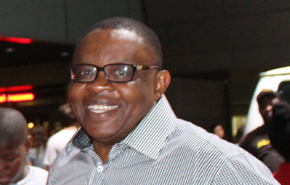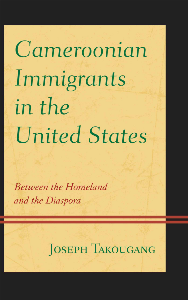Interview with Dr. Joseph Takougang
Conducted by Rodrigo Mariño-López

Thursday, October 18th, at 11:00 a.m, Joseph Takougang, Professor of African history will speak on his new edited volume, “Post-colonial Cameroon: Politics, Economy and Society,” (Rowman & Littlefield, 2018), along with his co-editor Julius A. Amin, University of Dayton. In the words of Professor Mark Dike DeLancey, from DePaul University, “This impressive collection of essays by Cameroonian scholars both abroad and at home presents a wide variety of insights into contemporary Cameroon with sections on politics, economy, society and culture, international relations, migration, and important concluding comments on the current political crisis.” In light of this event, we are taking the opportunity to speak with Dr. Takougang and feature his work on the Taft Research Spotlight.Joseph Takougang is Professor of African history in the Department of Africana Studies and an affiliate faculty in the Department of History at the University of Cincinnati. He obtained a BA in history from the University of Yaounde, Cameroon, and an MA and PhD in African history from the University of Illinois, Chicago. His research is on colonial and post-colonial Africa, with a focus on Cameroon, and secondary interest on contemporary African migration, particularly to the United States.
In addition to several articles in peer-reviewed journals and edited volumes, Dr. Takougang’s publications include: Cameroonian Immigrants in the United States: Between the Homeland and the Diaspora(Lexington Books, 2014); Africans in Global Migration: Searching for Promised Lands (Lexington Books, 2012, edited with John A. Arthur and Thomas Owusu); The Leadership Challenge in Africa: Cameroon Under Paul Biya (Africa World Press, Inc., 2004, edited with John M. Mbaku) and African State and Society in the 1990s: Cameroon’s Political Crossroads (Westview Press, 1998, co-authored with Milton Krieger).
Please tell us a little bit about your research, in a broad sense?
I was trained as a historian –focusing on African history–; that’s what I do. A lot of my research is on colonial and post-colonial African history and politics, with a focus on Cameroon. A second area of my research also focuses on African and Cameroonian in the United States.
b5e31c4f84e24e2d8343b1d73c9eef95.png?sfvrsn=dfb8ee7e_0) On 2004 you published the book The Leadership Challenge in Africa: Cameroon Under Paul Biya (Trenton, New Jersey: Africa World Press, 2004). Tell us a little bit about this book, as well as your views on Paul Biya and contemporary Cameroon?
On 2004 you published the book The Leadership Challenge in Africa: Cameroon Under Paul Biya (Trenton, New Jersey: Africa World Press, 2004). Tell us a little bit about this book, as well as your views on Paul Biya and contemporary Cameroon?
This is a co-edited volume, with my colleague, John Mbaku at Weber State University in Utah, which came out in 2004. At the time, in Cameroon, the Biya presidency had gone through a tremendous challenge. In the early 1990’s, the wind of change which started with the collapse of the Soviet Union and its satellite nations, encouraged African countries, including Cameroon, to begin to demand change. And, in fact, many people did not think that Biya would last, because of the popular feeling in Cameroon that it was time for him to go, and yet he survived. So the title of this book, The leadership challenge in Africa, fits that thinking on how this African leader was challenged, and yet he survived. In fact, in the 1992 Presidential elections, the popular feeling in Cameroon was that he lost the election, but managed to manipulate it, with the support of France, and so remained in power. So this book is a contribution –a series of chapters around different topics of politics, economy, women in Cameroon– while having a look at Biya’s resilience, his ability to survive.
Paul Biya has been in power since April 1982. In fact, we just had an election on Sunday (October 7th), where he ran again. The results are not yet out, but one of the opposition candidates has already gone out and released a Youtube clip where he is claiming victory. Why is this guy declaring victory? I don’t know. But, you know, to have one person in power for 36 years and still have him running for the presidency is ridiculous.
And yet he is still backed up by the French government…
 Yeah… If you are familiar with post-colonial Africa, France has always had the tendency to support leaders that advocate French policies in its former colonies. In most cases they have supported these type of candidates, and, generally, these candidates are people that think they will be able to win power if they are able to carry out policies that France wants them to. In fact, there used to be a joke a few years ago in Cameroon: Paul Biya makes very important decisions about Cameroon either when he is visiting France, or has just returned from a visit to France. So, what is the assumption? What is the conclusion? The conclusion is that he goes to France, and France tells him what to do, what to say, and he comes back and implements it. Now, there’s no proof, but that’s the general thinking by the public.
Yeah… If you are familiar with post-colonial Africa, France has always had the tendency to support leaders that advocate French policies in its former colonies. In most cases they have supported these type of candidates, and, generally, these candidates are people that think they will be able to win power if they are able to carry out policies that France wants them to. In fact, there used to be a joke a few years ago in Cameroon: Paul Biya makes very important decisions about Cameroon either when he is visiting France, or has just returned from a visit to France. So, what is the assumption? What is the conclusion? The conclusion is that he goes to France, and France tells him what to do, what to say, and he comes back and implements it. Now, there’s no proof, but that’s the general thinking by the public.
So you think that France still has a colonial interest in Cameroon?
A post-colonial one. It has a post-colonial view on Cameroon and many of its formal colonies in Africa.
As you have already mentioned, a recent research interest in your career is contemporary African migration, particularly to the United States. What are some of your ideas or insights in regard to this?
I have written a series of articles on African immigrants to the United States, and a book titled Cameroon Immigrants in the United States (2014). What you find is that there was an upsurge of African immigrants, including Cameroonians, beginning in the 1980’s, that sort of accelerated in the 90’s. And so the argument that I make in many of these articles is that independence brought a lot of hope and expectation for Africans; they thought that independence would mean political freedom, economic prosperity, social change, etc. Unfortunately, by the 1980s things where not getting better, as many Africans had expected. In fact, in countries like Ethiopia, Somalia, for example, where there were authoritarian regimes, or nations like Sudan and Sierra Leone that experienced civil wars, things were getting worse. In this context, a lot of young Africans began to say: “we can’t make it here, it’s too tough”. And so there was that surge in the movement of young Africans, young Cameroonians, to go overseas, to go to Europe, to come to the United States, to go to the Middle East, some of them have even gone to Asia. Wherever they think they can make a better living for themselves and their families. So it’s basically a movement that is spurred by political, economic and social reasons.
How do you see the African migration panorama under the current U.S. administration?
Well, it is tough; it is difficult. For instance, last year, winter 2017, there were lots of Africans in this country whose status had not been regularized, and were taking the risk to cross on foot onto Canada. There was even a case of two Africans –and that’s only two– who had frost bite on their hands, and their fingers had to be cut off once they got to Canada. So it is tough, even today, it’s certainly challenging, and I don’t have the statistics but I can almost guarantee you that the rate of Africans coming to this country has decreased drastically in the last year and a halve or two, because of the crack down on immigrants. And not only from Africa, but from everywhere.
The Department of Africana Studies includes the following description in their web page:
“The Department also seeks connections with the community -black, white and other- in Cincinnati. A commitment to social activism has been, is and always should be a dimension of a program based in large part on justice”. In this view, how do you relate your work as a researcher and a scholar to activism and social justice?
Well, my research and writings address that social justice aspect of the Department of Africana Studies in almost everything I write, in the sense that I am pointing out some of the failures of African societies, Cameroon in particular. And these things often help government agencies, whether national or international, to understand some of the challenges that Cameroon and many African countries face today. For instance, when the new ambassador to Cameroon was appointed almost a year ago, I had the opportunity to be one of three country experts who was invited to the State Department to brief the new ambassador on Cameroon, and my guess is that they learned about me from my writings. They wanted to hear from an expert. So you can see how my writings are helping government institutions, like the United States Government, to have the knowledge, the information, about a country before it sends its representatives there, so that an ambassador will have a broader knowledge on how to address certain issues. I’ll give you another example: in the 90s, when I wrote a book entitled African state and society in the 1990s (Westview Press, 1998, co-authored with Milton Krieger), I was often called on as an expert witness by attorneys and law firms who had asylum and refugee cases. In other words, because of my work, I could make a case for Cameroonians who were seeking asylum in this country. Therefore, you see how my work in helping to promote social justice is helping to promote Cameroonians, who left the country for various political reasons, to be able to get protection in this country. This is the social justice aspect of what I do.
What role has Taft played in your research?
The Taft Research Center has been incredibly supportive of my work during the more than two decades that I have been at the University of Cincinnati. They have provided financial support that has allowed me to present my research at professional conferences and in every book I have published. I think it is a vital institution in the college.